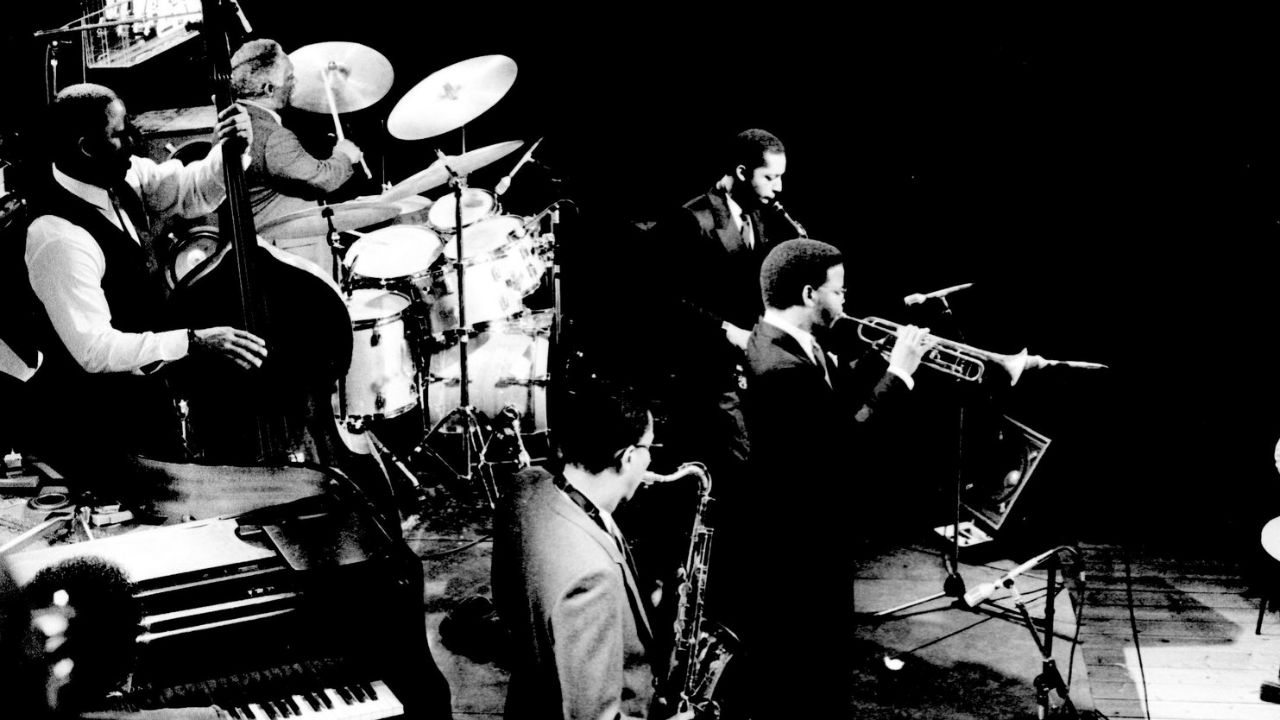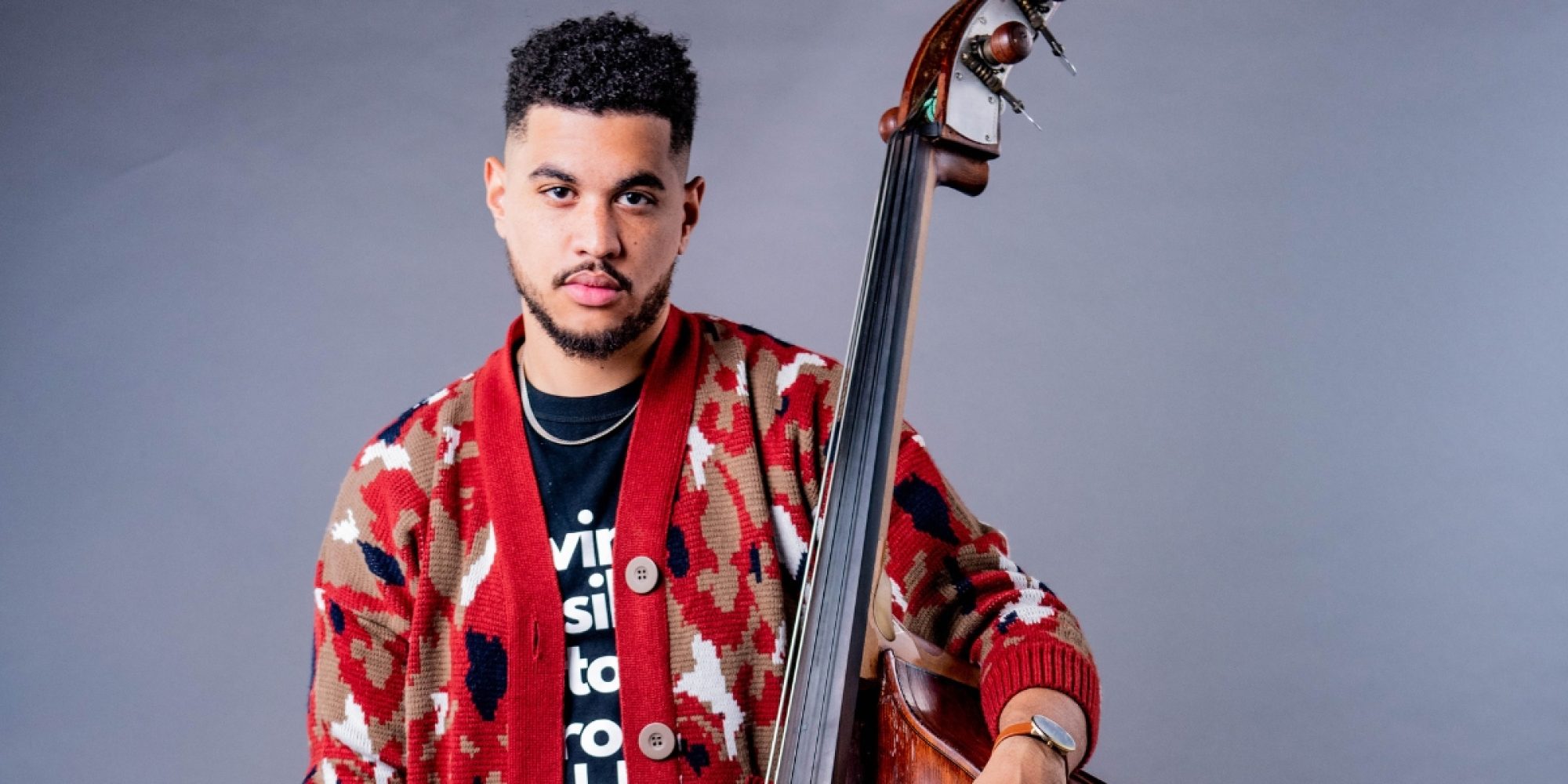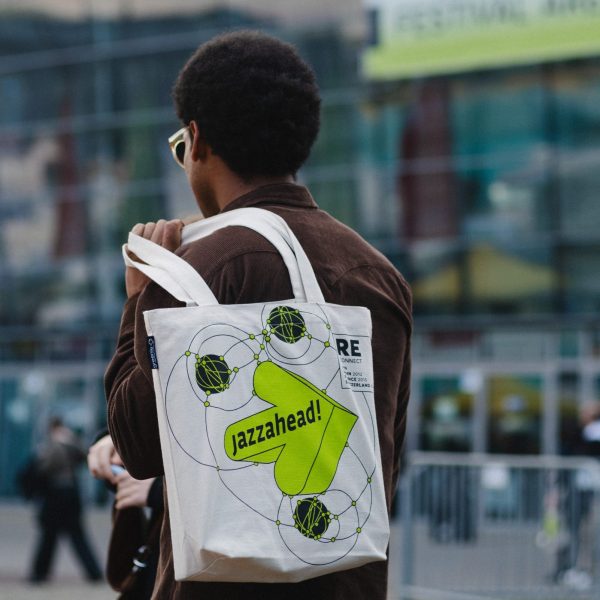Bassist and composer Benjamin Jephta was “born-free” in 1992 in South Africa, in the post-apartheid era, and grew up in the “colored township” of Mitchell's Plain in Cape Town. The exploration of these terms – “born-free” and “colored” – became the focus and title of his 2023 album, Born Colored, Not Born-Free. As he has described it: “The compositions draws musically from traditional South African styles such as the Ghoema/Cape Jazz and Marabi music as well as modern African music idioms such as Gqom (a style of ‘house’ music), kwaito and hip-hop.”
Jephta has been performing since the age of 14 and graduated from the jazz program at the University of Cape Town in 2013. He released his debut album Homecoming in 2015, which saw him beginning to explore his own history, creating what he described as “a musical biography of his life.” This journey of self-exploration would continue to be a focus of his compositions and albums. He released his sophomore album An Evolution of an Undefined in 2017. And in 2019, he moved to Boston to attend the Berklee Global Jazz Institute, eventually receiving a master's degree. In a 2024 interview, Jephta reflected on his time at Berklee, noting that “their whole ethos is built around social justice and activism. So they really encouraged us to dig deep, and pull out from where we come from and how that relates to creating music for social change.” He then did a stint in New York City, where he performed with numerous artists, including NEA Jazz Master Dianne Reeves and Grammy-winning Panamanian pianist Danilo Perez, before returning to South Africa. He is currently based in Johannesburg, working as a performer, film/TV composer and lecturing in Jazz Studies and Film Composition at the University of Witwatersrand.
We were fortunate to arrange time for an interview with Jephta during the Jazzahead Conference last month where he would be showcasing music from Born Colored, Not Born-Free. The following was edited for clarity and length.
Ron Deutsch: Let's just jump right into it.... The number one thing, and I know you’ve discussed encountering this when you were studying at Berklee School of Music in the States. There are these terms “colored person” and “person of color,” but the definition of these terms are very different in a South African context as opposed to what they mean in the United States.
Benjamin Jephta: What you are saying is exactly why I frame what I do through this lens. Yes, even when I’m in the States, when I introduce myself to people and they ask me where I'm from and all these kind of things, I say, “South Africa” – and then I always feel like I have this sort of responsibility to say, “And you know in South Africa, while I might look Black to you, while I might be black here, in South Africa I'm referred to as colored.” And in South Africa it means a totally different thing. And so it's important for me to say this, because – have you ever been to South Africa?
No.
So you can go on a plane right now, and you go to Cape Town, for example, and like 52% of the population is what we'd call colored. And colored, the meaning, is also a very complex thing, but what you really need to understand is that colored is not about skin tone. It's not an in-between of black and white. It's not necessarily like – although in many ways during apartheid, which we'll probably get into these things when we speak – they made us seem like we are separate from a Black. And Black people started to see us as separate. And for this project, I'm really trying to get it exposed, but also get to grips with this idea that we are not separate – we are Blacks, right? But at the same time, it's kind of to give a voice to these people, a voice that has been in some ways suppressed because of political and cultural dynamics.
As you say it can be confusing because we are talking about a different understanding of racial identity.
That's why even coming to Jazzahead, I have so much different music I can represent, but I thought, coming to Europe, let's present this thing. There's a good chance no one knows what this is about. And there's a good chance for me to, not in an arrogant way, educate people. Especially people in jazz and the arts, they know about other cultures, but you might not know this about us. And so that's why I wanted to bring this project here.
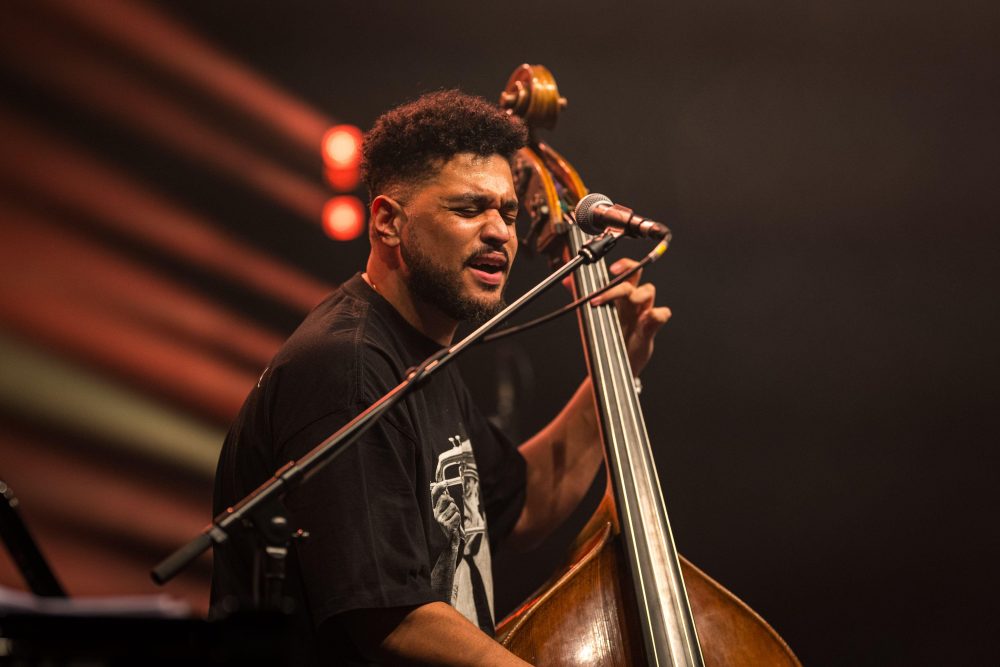
I want to not sound like an idiot, but I guess I am going to sound like one in trying to break it down with you here. So, on the one hand, we have these divisions that are not about skin tone, but on the other hand we're still talking about color.
It's not about skin tone. Like I have cousins, aunties, uncles who are black-black, and cousins, aunties, uncles who are white-white. But they are still colored people because of their ethnicity and the culture.
I think you need to understand what I mean by colored and then maybe that will help out. Because, obviously, you are viewing this word and its meaning and how it's played through the lens of American history and American culture. So first of all... don't do that.
That's kind of the first thing, it's not the second. Let me quickly give you the spiel – because I have to probably do this tonight at my showcase as well, just to give people context. So the spiel is that apartheid was meant to segregate people, specifically people of color, to create a hierarchy between people, specifically where the dominant group is white, and everyone else is underneath that. So, part of the apartheid strategy was to create different nonsensical laws, like one specifically was the group areas, where you separate people according to their race in different areas. Like the Marriage Act. The Marriage Act means you could not marry outside of your race. Or like Separate Amenities Act, which was like that's a white person's chair, that's a black person's chair, and that's a colored person's chair. But back to race, all of these laws were based on the first act, which was the Population Registration Act, which classified people according to race.
There were three races?
Actually, there were four. Again, as I'm saying this, you have to understand this was one of the tenets of apartheid. In many ways it was meant to diminish people's rights, and it was kind of based around – for lack of a better way of saying it – stupid ideologies, the stupid ways of defining it. I can tell you one of them now. So, the four races were white, Black or African, colored, and Indian or Asian. And it would also say under a descriptive something like for black it would say “of Bantu descent” or something like that, which means the Bantu or the Ngoni people who were the people of southern African origin in the region, right? Actually, more from Kenya; they migrated down. And the interesting thing about colored was, it would be described as “not native and not white.” That was the description. That's colored. Yes, not native and not white.
So first of all, as I'm saying, this is stupid. They don't make sense, but these are the things they used to enforce the population. They separated the people and gave certain people access to things and other people not. Like colored people could vote at some point, and Black people still couldn't. Stuff like that, right? This was nothing people of color asked for, but it was meant to divide and conquer. It is something I did not ask for, something that was meant to harm the way we interact socially, and create a kind of animosity.
So, maybe going back to the stupid, you know how they would see if you were colored or Black? They would do what they called a pencil test. If they couldn't figure out if you were colored or black, for example, they would put a pencil in your hair and if the pencil dropped out, you were colored, and if it would stay stuck in your hair then you were Black. So I'm just trying to give you an idea of how stupid this was.
That is incredibly stupid.
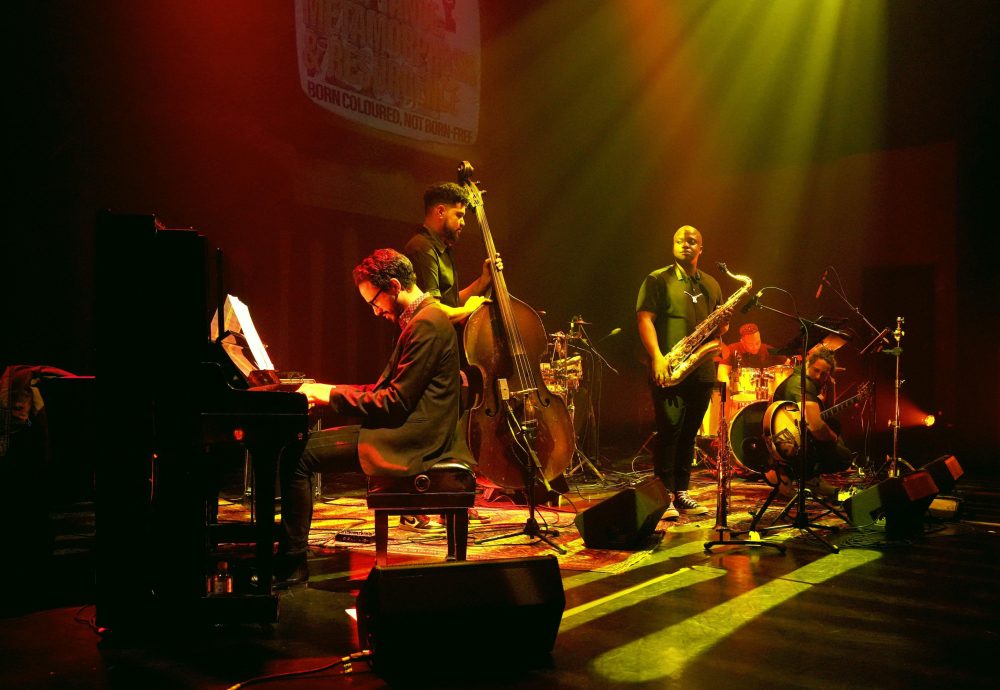
Oh, yeah. So these racial groups were meant to divide us. They were meant to create segregation, and they were in many ways meant to reinforce animosity between races, because we were the majority and the government didn't want us colluding and making plans and creating organizations and overthrowing the government, right?
And so that is what this project deals with and the fact that I'm also what is considered “born free.” So “born free” is post-1990, and when Nelson Mandela was released and the A.N.C. took power. And so we are now a democratic country and we're having the first democratic vote. Everyone born in that period and after is considered “born free.” Basically meaning we are born into a racially free and undivided democratic society. But remember that I would be classified under apartheid regime as colored. And so we are now interacting in a social way with those stereotypical things still in place. Now we are in a free society and we are also born free, but those two ideas kind of creates this weird dichotomy, because these divisions still exists on a day-to-day basis. So I'm still called colored, even though I should have just been black in the beginning. But now I cannot remove this coloredness from my description in some way, because if you go to South Africa, the whole culture is formed around this racial idea.
Do you know what your family background is?
Let me explain.... The heritage of colored people is technically very boring, but I can tell you. So in the 1600's, Jan van Riebeeck and the Dutch East India Company, they came from The Netherlands down and settled in the Cape Colony, right? In the Cape Colony, they found Bantu people – so people from the kind of central to a little south, but they also found what you call the Khoisan people, which are kind of really the original inhabitants of that area. So there was the Dutch, there were also some French involved, but they were at war over the place. Obviously we were also a Commonwealth colony, so England also had something to do with it. So all of those people did the thing – they raped the women and colored people were formed. So there was no intermarriage, just rape. And you know, I'm really just trying to simplify it here. When I talk to African-Americans, their grandparents or great-great grandparents came from Africa. I can't tell you that. I don't know where I come from. I don't know what my mix is.
That's why I'm talking about ethnicity more, because even though it was a racial thing, now – since apartheid but also before and during – a kind of culture formed around coloredness and colored people. The food we eat, the languages we speak, the way we interact, and it still exists today. Which, in some ways is beautiful, but in some ways is still harmful. Because it still perpetuates these kinds of racial hierarchies.
So there is a culture, an ethnicity of coloredness. It's not related to color on one level, but yet it does in a way. But it is its own culture – colored. So in regards to the questions you are raising in the album, that you want to identify as Black, is it your thought that you want to get rid of that term colored and say one is either Black or white?
It's even more complex than that. Okay, maybe two things I'll say. The first one is just describing that the title of the album is kind of speaking towards this juxtaposition or this dilemma between the two ideas that I am, in fact, not born free, I don't feel born free. I feel more that I'm still colored because I'm in a society where people still have these kinds of weird social interactions with colored people versus Black people versus white people. But outside of that, I would hope – or I want to be seen – as just Black. I just want to be seen as Black and, in fact, I believe I am Black. And so another thing that I say often is that culturally I am colored because there is a culture around it, it is a way of being, but politically I am Black. Because I am against everything that was kind of done towards us – these kind of boundaries that were put in place because of apartheid.
So you are choosing to say, “I'm Black.”
And it's not in the sense that I know that means something different in the States. It's not the same. Like I said, it's super complex. So let me give you an example, When my band is on the stage. You'll see different skin tones of people, most of my band is Black. The drummer – he's Black. His ethnicity is Zulu. He's a Zulu black guy, right? So that's what I'm saying, I'm Black, but kind of my cultural background is colored in the South African context.
Okay, I think we've laid enough groundwork for people to have a grasp of the complexity of this. Now the impetus for the album, for the music on the album, you've explained it was about asking all these questions.
Yes.
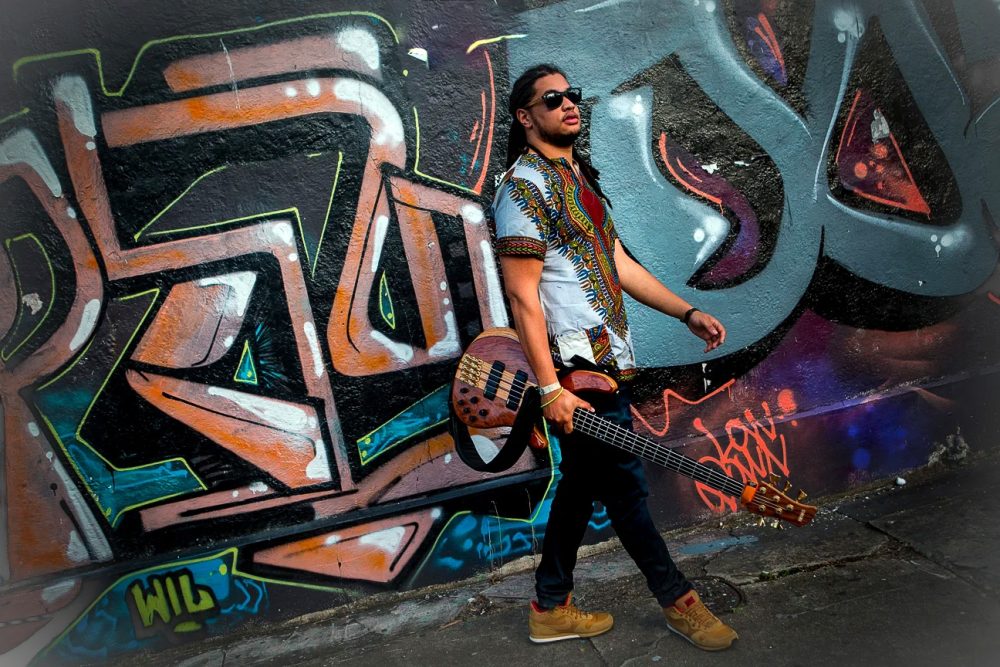
So now that the album is done and out there, and through the music itself, looking and raising these questions, have you found any answers?
No.
For me, the music it's more like asking the question was the point. There are many different answers, many different experiences. But it's kind of about having this question be out there. Interrogating these structures of race, interrogating racial ideas, and sort of interrogating how we interact. Why do we still live in separate communities? Why do we feel this way about black people versus colored people? All these kinds of things. It's interrogating these things. All the questions around all this was, for me, more important than actually trying to answer them.
I think the answers depend on context. The answers are different for different people because of their different experiences. And again, I'm not interested in the answers because in many ways this is such a complex thing that it's hard to answer, really. As I said, it's like, for me, just saying during all this history of apartheid, and after that, we're still living the legacy of that now. And so, for me to go up to someone and say, “Oh, I'm not colored, I'm Black.” It's weird. People can't just make that switch, it's so ingrained in society. Even now, when we fill out any official form, there's still a distinction between colored and Black. They're still on the forms because they want to know what kind of disadvantaged background we come from. And I'm like, “But why? Like we were all disadvantaged! We did not choose any of these parts.” And you can't just break it. So for me, it's more to evoke questions like: “Oh, but now think about the nonsense things that it was all based on, and we've formalized it in our society. Don't you think that's stupid?”
That's kind of why this project is for provoking questions, more than actually telling you, “Okay, so the answer is I'm not Black, I'm not colored. Or I am Black, or what?” For me, that's what my experience is. I feel that through this process I'm politically Black, culturally colored. But I'm not imposing that on another colored person. You know, all I'm saying is to ask yourself these questions.
Let's talk about the music. In terms of asking these questions, I mean, obviously the question is there in the title of the album and all, but how do you express these questions in music?
[Laughing] Okay, so in some ways the more kinetic answer to it is like I did this, I did that, I wrote this and it means this, but I don't like to think of music or art in general in that way too much, because I am a very methodical person in my own personal life. But I would say that I've also had a lot of experience with writing music for narratives. I write some film music, for TV, theater in South Africa, so I have a lot of experience of, “Okay, this is the story. How can music support and speak to the contents of this narrative?” And so when it comes to my compositions in my artist jazz career, I think I approach it in a very similar way where there are certain things that I think tell the story better. But I would say most of the work is conceptual. Most of the work is me trying to understand what is the story I'm trying to tell. Often stories, other people's stories, sometimes my own experience. A lot of it has to do with “feeling.” How do I feel in this moment, trying to understand?
I can tell you the first song on that album is called “An Incomplete Transition” and that has to do with the idea of the kind of movement of society from apartheid era to a post-apartheid era, and how we haven't fully made the transition into this nation of a free and divided country. And for me, just meditating on that idea, I came up with a composition using certain compositions or tunes, incomplete melodies, statements, ideas, chordal movements that kind of perpetuate the idea of a feeling of being incomplete. But also setting up, “Okay? where are we going?” So it's more conceptual thinking.
Two of my favorite South Africans, Pilani Bubu and Nduduzo Makhathini, who you both know as well, they talk about how there is an element of ritual when they perform. It's not just playing music. It's a spiritual ritual element that goes back traditionally to what music was used for, for healing, and all these kinds of things.
Yes, there is a tradition among the Khoisan, what was called the “Keepers of the Quoom,” much like the griots of West Africa, people who tell stories. But I don't really like to talk about this. I think in many ways, you try to keep the art of making a thing sacred. It's a very personal thing. And when I play, I want them to enjoy it without understanding the mechanics of how it works. I'm all about just playing music and people enjoying what we're about to present, but in many ways, when I play, we access things that I feel like I've never known before – stories I've never known of before – or ways of musical compositions that have come through me. And the only way to explain it is the idea these stories are stored within us somewhere. And when we have these creative exploits or creative ways of being, we access a lot of these stories, and on stage is that for me a lot. When you're on the bandstand, we're trying to tell stories, and we kind of have to be open to what might happen. So I'm hoping that's gonna happen tonight.
So do I. And I think we're done.
Thanks, Ron.
Related Audio Programs
